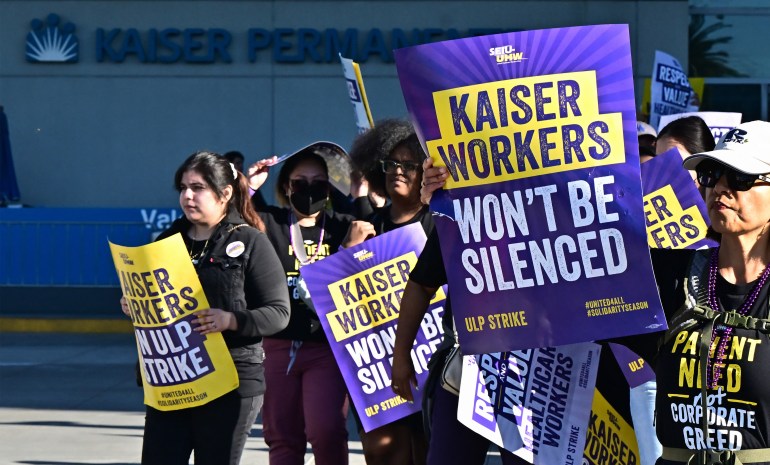
Claire Chang, a visual merchandiser at sporting goods retailer REI’s flagship location in New York City, was drawn to the company because of her then-burgeoning love of nature.
After working in an office environment, she said she was looking for something a little less stressful. That brought her to REI, where she has now worked for six years.
The company is considered a progressive beacon in the American economy and is known for its support of sustainability and indigenous rights, among other things. It is consistent with their interests and values. But starting in October 2020, things started to change for her, Chang says.
At the time, Chang and her colleagues pushed the company for increased health and safety protections amid the COVID-19 pandemic. That’s why it was among the first stores to vote to unionize.
She felt the Washington state-based retail cooperative, formally known as Recreational Equipment Inc., has since dragged out union negotiations. Chang says they are still fighting for their first union contract and negotiations began in June 2022.
This began a long and drawn-out battle between their colleagues and the company – a battle that is far from over, and in early November the Retail, Wholesale and Department Store Union (RWDSU) filed a grievance on behalf of the workers with the National Committee for industrial relations.
The complaint alleges that the sporting goods cooperative took actions that RWDSU described as “emotional manipulation and retaliation against employees, such as layoffs, changes in work schedules and disciplinary actions.”
Chang trusts REI’s reputation as a progressive company and says she had hoped they would approach union negotiations in good faith, but that hasn’t been her experience.
“In reality, they are [REI] “We have fought each other every step of the way since the beginning,” Chang told Al Jazeera.
Chang says she saw surveillance tactics at her store and claims the company brought in senior executives to talk to them.
Last month, work stoppages occurred at locations in Minnesota, Massachusetts and Illinois.
This was in response to what RWDSU said was the retailer’s “decision to unilaterally restructure jobs and working conditions across all of its stores.”
The company cut 275 jobs in mid-October.
Meanwhile, REI changed law firms as part of the negotiations, essentially starting the process all over again as the 85-year-old company reported record revenue of $3.85 billion in 2022.
In an investor note, the company said that “REI committed an additional $50 million in salary increases for hourly employees in 2022 and committed an additional $92 million for employee retirement benefits and bonuses.”
However, Chang says that was not her experience. She claims the company withheld these raises during union negotiations at her location. REI did not respond to Al Jazeera’s request to confirm the validity of these claims.
“Influence brand loyalty”
From a sales perspective, this year could be very different for the retailer – especially this quarter, the holiday shopping season.
Thanks to a combination of more public pressure from the company’s already highly attentive and socially conscious customer base, this could have an impact on holiday shopping, experts say.
“REI has a strong brand image associated with outdoor enthusiasts and a commitment to sustainability. If consumers perceive that the company is not living up to its values of treating workers fairly, this could undermine trust and affect brand loyalty. This may cause some consumers to reconsider shopping at REI during the holiday season, said Linda Simpson, a financial literacy professor at Eastern Illinois University.
Chris Brinlee Jr. is one of those consumers. Brinlee, who works in the outdoor industry, called out the sporting goods retailer on social media. In the company’s “Cyberweek Sale” Instagram post, he wrote: “I would rather never spend money on REI than support a company that actively opposes unions.”
Brinlee Jr. has more than 36,000 followers.
“One of the few ways we can organize as consumers is to decide how and where we spend our money,” Brinlee told Al Jazeera.
“They are clearly acting against the interests of their employees,” he added.
“By taking action against the union, REI could be perceived by its core consumer segments as violating its core brand identity. Consumers are known to punish brands for violations,” Aparna Labroo, a professor of marketing at Northwestern University’s Kellogg School of Business, told Al Jazeera.
That’s exactly how Brinlee Jr. shopped there once a month without any problems until he learned about the anti-union allegations at REI, and then he stopped. He says he would consider returning if the company starts work in good faith with its workers.
“The impact on consumer sentiment and shopping habits during the holiday season will depend on how the public perceives the union fight, how REI responds to the situation, and what values consumers prioritize when making purchasing decisions,” Simpson said.
Brinlee Jr.’s position is anything but isolated. Alex Bartolo, a wildlife biologist from Long Beach, California, is among other consumers Al Jazeera spoke to who all say they are cutting back or boycotting the store altogether. Bartolo also has an REI credit card, which he said he plans to cancel.
“I think if REI supported the wishes of their employees, negotiated in good faith and stopped union busting, I would reconsider my opinion,” Bartolo told Al Jazeera.
REI did not respond to a request for comment.
Slowed economy

The confrontations at REI come at a time when the popularity of unions is increasing among ordinary Americans.
According to a Gallup poll At the end of August, 67 percent of Americans approved of unions. This is the highest value since the 1960s. Workers in every industry — from Starbucks baristas to nurses at Kaiser Permanente health care facilities — took to the picket lines this year to demand better working conditions.
Chang says she fully expects there will be work stoppages during the holiday season.
This comes at a difficult time for retailers broadly, with interest rates high and the economy slowing, which could prompt consumers to spend less.
According to a survey by PYMNTS, 77 percent of Americans plan to spend less this holiday season than in previous years due to increased interest rates. Moody’s also forecast moderate growth for the retail sector of 1 to 3 percent – compared to 5.1 percent last year and 14 percent the year before.
That’s the result of a decline in spending and an increase in the number of Americans living paycheck to paycheck. According to PYMNTS, that’s 60 percent of Americans.
Labroo argues that sentiment is fueling the REI union’s momentum.
“People are struggling for liquidity – and as they struggle, they also become more aware of how others may be struggling,” Labroo said.
For Chang, that means more support from the shopping public as she and her colleagues jostle for a seat at the table.






Recent Comments